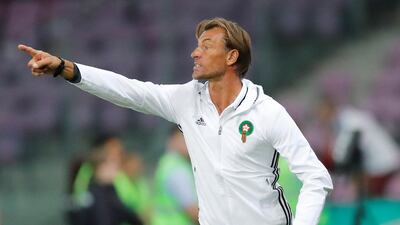His "lucky" white shirts ironed and packed, Herve Renard sets off for the provincial city of Voronezh on Sunday hoping to maintain an impressive record in major tournaments.
Renard will be at his first World Cup as a manager, in charge of a Morocco who have not been at the event for 20 years, but has his position because he knows how to navigate tough groups. In four attempts managing at Africa Cup of Nations, Renard has only once failed to guide a team beyond the first phase.
His reputation is made from more than that, of course. Zambia in 2012 and Ivory Coast, three years later, both lifted the continent’s most prestigious prize under his watch, and his trademark white collared shirt became a most coveted garment on African touchlines.
Morocco recruited him. Though they made only the last eight of the most recent Cup of Nations, in early 2017, Renard had the trust of his Federation.
_________________________
Read more on the 2018 World Cup:
Guides, predictions, galleries and where to watch in UAE
World Cup Group B guide: Ronaldo's last chance to win the big one with Portugal
World Cup 2018 home kits ranked - in pictures
________________________
By the end of the year, Morocco had pushed ahead of the Ivorians - present at the last three World Cups - to reach Russia, and to bring to perhaps the toughest of all the first-round pools something Spain, Portugal and Iran would all envy: A succession of clean sheets as pristine as Renard’s shirts. They conceded no goals on the way to qualifying.
Renard’s priority is to keep Iran goalless in Friday's opening match. He went into Saturday night’s final warm-up fixture against Estonia with a couple of pending decisions about how to organise a defence that is Morocco’s biggest strength.
The goalkeeping position continues to provoke debate at home, but as Renard has continually pointed out, the arguments over whether Munir Mohamedi or Yassine Bounou should be given the gloves are quarrels based on blessings.
Munir is the proud owner of the impeccable World Cup qualifying credentials: six games, six shut-outs. He kept another clean sheet in last week’s friendly in Switzerland against Ukraine. In club football, though, he has endured a frustrating season, consigned to the substitutes’ bench at Numancia, of the Spanish second division.
By contrast, Bounou’s career has progressed at a pace, since his promotion as first-choice at Girona, of Spain’s Primera Liga. Renard gave Bounou the gloves for the 2-1 win against Slovakia on Monday although that, he reminded reporters, should not be read as a pointer to any change in heirarchy.
At full-back, there is a concern over the fitness of Nabil Dirar, whose recuperation from injury has meant his missing the warm-up fixtures, in order that he is allowed to progress to fitness without risk.
Renard describes a “little muscle problem” inhibiting the Fenerbahce right-back; the recovery has been extended long enough that it seems likely that Achraf Hakimi, the teenager from Real Madrid, is in pole position to fill the right-back role against Iran, probably in a back four, although Renard experimented with 3-5-2 in phases of the recent friendlies.
Mehdi Benatia, the captain bearing last month’s Serie A and Italian Cup winners medals from a fine campaign at Juventus, remains the key man, both in marshalling that mean rearguard and at set-pieces going forward.
Morocco have worked hard on their dead-ball scenarios and have a range of experts at delivering them, such as Hakim Ziyech, Younes Belhanda, Faycal Fajr and Al Jazira’s Mbark Boussoufa. “It will be a question of making the most of the few chances we will get," Renard said.
“We will be tough, and that’s for sure,” Boussoufa said after the draw with Ukraine. He will operate in a midfield that is confident in possession and capable of providing good supply into the opposition penalty area, where the want of a high-calibre finisher is a concern.
Encouragingly, Ayoub El Kaabi seems to making the jump from Moroccan domestic football comfortably and with good timing. The 23-year-old, from Berkane, has followed up his eye-catching nine goals for Morocco in the African Nations Championships - the tournament open only to Africans playing in African leagues - with goals in recent friendlies and looks a useful alternative up front to Khalid Boutaib.
Renard needs an element of surprise, for his solid Morocco not to become too predictable, or that opponents suppose they can be closed down largely by suffocating the creative Ziyech.
“The good thing,” Benatia said, “is that some of the younger players have shown what they can do in our friendlies.”
El Kaabi, or 20-year-old Amine Harit, and Madrid’s Hakimi have a chance on the big stage to make themselves stars.


